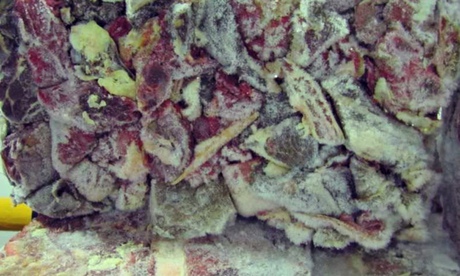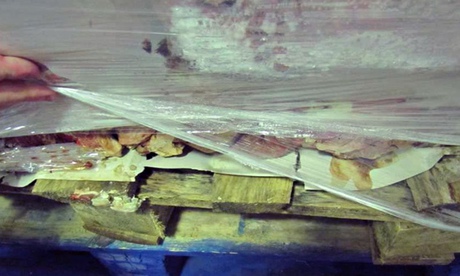
Photograph showing meat detained at the Irish burger manufacturer. Photograph: Supplied by chief veterinary officer of Poland
A large consignment of green and rotting meat fit only for petfood was found by Polish food safety investigators investigating the horsemeat scandal at a leading Irish processor – prompting claims it could have ended up in the human food chain.
The meat was found at the giant Silvercrest factory in County Monaghan,Ireland, which produced frozen burgers adulterated with horse for Tesco, Aldi, the Co-op and Burger King. The investigators examined the raw material in early 2013 as part of their official inquiry in to the scandal.
Their report suggests recycling meat deemed 'not fit for human consumption' into the human food chain was part of the horsemeat fraud. But the Irish manufacturer, backed by the Irish government, says it was rotting only because it had been stored for inspection as part of the horsemeat inquiry. They say the quality of the meat had been affected by repeated unpacking and examination as part of the investigation.
The 30-page report by the chief veterinary officer for Poland was compiled after a formal visit by inspectors to Irish plants implicated in the horsemeat scandal. Photographs of the meat showed it was a mixed batch of very poor quality and parts had turned green. Polish investigators say it was destined for burgers but must have been unfit for human consumption all along. "What I saw was clearly unfit for human consumption. It was part of a bigger consignment but I was told the rest of it had already been used," inspector Katarzyna Piskorz said. "I asked why the factory managers had not noticed the state of it, but was told they had not seen any problem."
The Polish report explains how inspectors examined eight pallets of meat from a delivery of 22 pallets that had been destined for burger production. The pallets had been detained at Silvercrest in January 2013 by the Irish authorities, who had sealed them in a refrigerated lorry when horse DNA was found in the consignment.
The Polish team insist the Irish authorities had allowed them to examine meat that had not been fully unpacked before their arrival and, but for the discovery of horse, would have been sold as burgers.
 Spacers made from paper rather than cardboard. Photograph: Supplied by chief veterinary officer
Spacers made from paper rather than cardboard. Photograph: Supplied by chief veterinary officer
When it was fully unpacked, they say they found old meat that was green and rotting or brown and had been deliberately mixed with fresher red meat. The meat pictured in their report is unhygienically wrapped and labelled with official Polish veterinary marks and factory labels that the Polish authorities believe are copies or reused from other consignments.
ABP said the meat and its packaging had deteriorated because it had been stored in a refrigerated lorry for three weeks under quarantine conditions – rather than those for meat intended for the food chain. It said the meat had deteriorated while being moved and unpacked for testing. All the meat arriving at the factory had the correct documentation on arrival and would have been tested before being passed, it said. ABP also insisted none of the burger meat in the consignment had left its plant or entered the food chain.
However, the former head of enforcement for Northern Ireland's agriculture department, Mike Steel, expressed doubts about this explanation. Meat that had been poorly stored and moved for testing would be expected to rot uniformly and not in the patchwork way seen in the photographs in the Polish report, he said. The photographs and descriptions suggested meats of different origins and freshness had been mixed and frozen from the start in a way not seen in authentic beef trimmings intended for the human food chain, he added.
"The temperature in the refrigerated vehicle is not specified but it should have been low enough to prevent significant deterioration in meat stored as evidence, over a period of four weeks. Nonetheless, if the meat had deteriorated I would have expected it to deteriorate more uniformly. The condition of the meat and packaging, as photographed, appears to me to be significantly worse than would be attributable to normal storage and sampling of blocks of frozen meat."
Speaking to the Guardian, the Polish inspectors reiterated their belief that the pallet they inspected had not been defrosted between the time the meat was detained and their arrival weeks later. "Irish inspectors and a company [manager] said these pallets had been not unpacked [and] had been not defrosted too," Piskorz said. If the rotting had been caused by repeated unpacking, the meat would not have looked as it did, she claimed. "In my opinion, the green and brown meat mixed with red meat could not be the result of three weeks in the lorry. It is impossible. After three weeks in high temperature, all meat should be green or brown. It would be putrid, not some red like fresh frozen meat."
The Polish inspection team said they were also told of further fears that unfit food had entered the human food chain.
This fear related to a Northern Irish cold store caught with a large consignment of horsemeat on its premises. The meat had originally been supplied to another Irish burger manufacturer. Fragments of red plastic packaging were found in the blocks of meat, meaning it should have been condemned as unfit. The Polish CVO report says that UK investigators believed initially the print on the fragments said "Friskies", the name of a petfood brand. But sources close to the investigation say they now believe the label says "frosties", and may be discarded sweet wrappers.
The UK regulator the Food Standards Agency said it had been unaware of the Polish report. As a result of the Guardian's investigation, the FSA has passed the findings to the City of London police, which is responsible for the UK end of the criminal investigation into the horsemeat fraud.
The Irish government confirmed Polish officials had told it about the report last December, but said the authenticity of the labels on the meat was a matter for the Poles.
Prof Chris Elliott, who has been asked by the UK government to review the horsemeat scandal, said the Polish findings raised serious health and safety concerns. "From the investigation by the Polish authorities we now have allegations that part of the fraud involved meat that was not fit for human consumption entering the food supply chain. They are disputed but they have supported their allegations with substantial photographic and documentary evidence, and if the allegations are correct, it is a very worrying development."
ABP, the high street retailers and Burger King, which sold burgers adulterated with horse, have always maintained that they were unwitting victims of fraud elsewhere in the supply chains. ABP has acknowledged its Silvercrest factory breached its contracts by sourcing cheap meat from suppliers not approved by its customers and blamed rogue managers, but said it had never knowingly handled horse. ABP has since sold the factory. The cold store in which the label fragments are said to have been found did not respond to Guardian inquiries.
Mike Steel added: "It is difficult to provide a reasonable explanation for this reported finding of fragments of packaging in the cold store meat.
"No extraneous material should be found, nor is usually found, among the blocks of meat fit for human consumption. Normal packaging and processing does not allow it to happen. That any extraneous material should be found in this way raises serious questions about where the pallet was assembled.
No comments:
Post a Comment
thank you for your precious time and feedback.